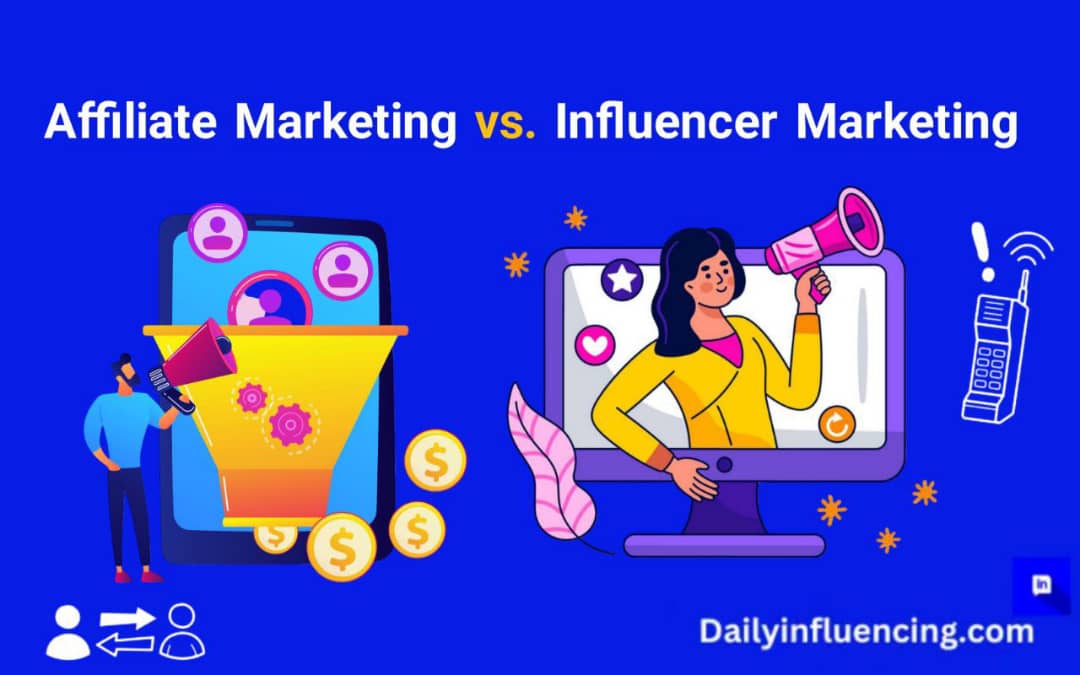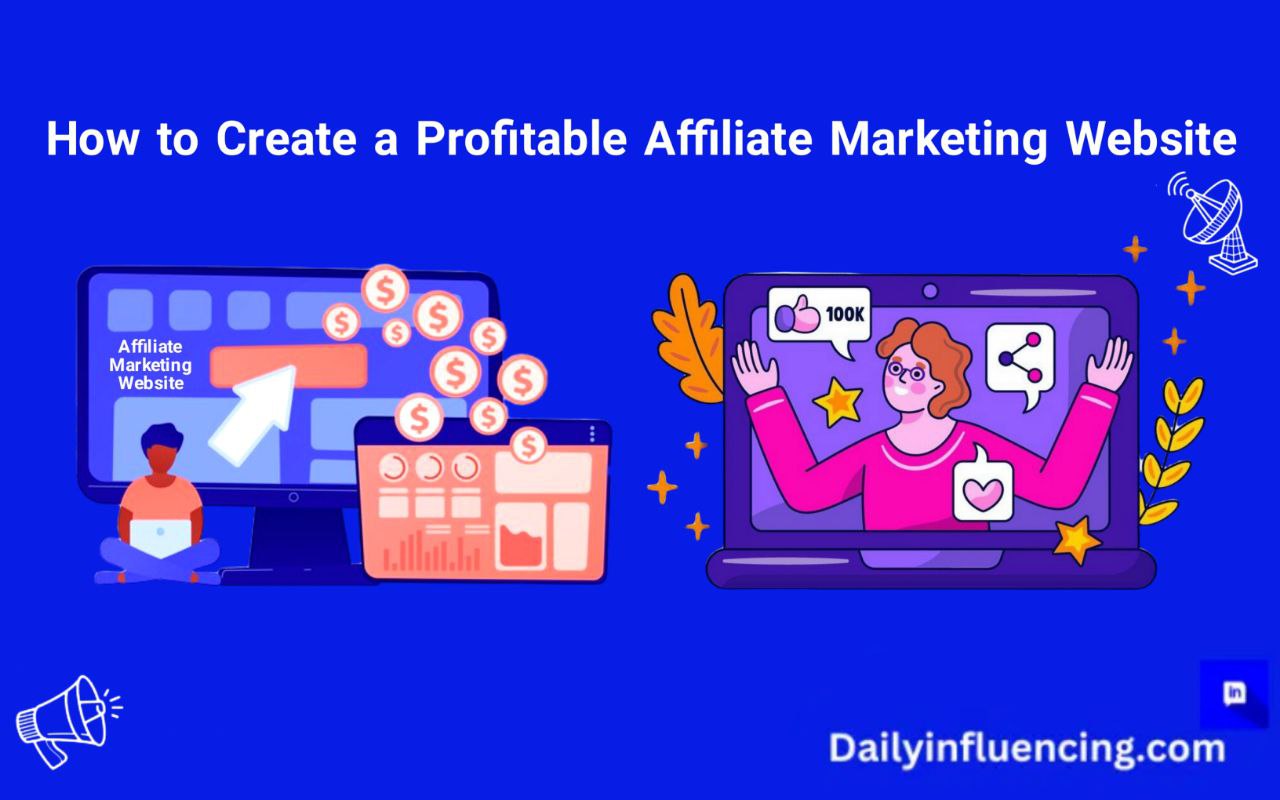
Affiliate marketing has become one of the most popular ways for individuals and businesses to earn money online. At the same time, influencer marketing has gained massive attention, with brands partnering with social media influencers to promote their products. While both strategies involve promoting products or services to an audience, they have significant differences in how they work, who participates in them, and the results they generate.
Understanding affiliate marketing vs influencer marketing is crucial for businesses and marketers who want to choose the best strategy for their goals. Should you rely on affiliates who earn commissions based on sales, or should you work with influencers who promote your brand through their personal influence?
This article will break down these two marketing strategies, highlight their differences, and help you determine which one suits your needs best.
If you’re a beginner, don’t worry. This guide is designed to be simple, clear, and informative, making it easy for anyone to navigate and understand. By the end of this article, you’ll have a solid understanding of affiliate marketing vs influencer marketing and be able to decide which approach works best for you or your business.
What Is Affiliate Marketing?

Affiliate marketing is a performance-based marketing strategy where individuals (affiliates) promote a company’s products or services in exchange for a commission. Instead of being paid upfront, affiliates only earn money when they drive a specific action, such as a sale, lead, or click.
How Does Affiliate Marketing Work?
A Company Creates an Affiliate Program – Businesses set up an affiliate program and invite people to join as affiliates.
Affiliates Sign Up and Receive a Unique Link – Each affiliate gets a special tracking link to share with their audience.
Affiliates Promote the Product – They promote the product through blogs, social media, YouTube videos, email marketing, or other channels.
Customers Click and Purchase – When someone clicks the affiliate link and makes a purchase, the affiliate earns a commission.
Key Features Of Affiliate Marketing
Commission-Based – Affiliates only earn when they generate results.
Performance-Driven – The more effort an affiliate puts into promotion, the more they can earn.
Long-Term Strategy – Once an affiliate has established their audience, they can earn passive income.
Affiliate marketing is widely used by bloggers, content creators, and website owners who have an audience that trusts their recommendations.
What Is Influencer Marketing?

Influencer marketing is a strategy where brands collaborate with social media influencers to promote their products or services. Instead of earning based on performance, influencers are usually paid upfront for their content and influence.
How Does Influencer Marketing Work?
A Brand Identifies an Influencer – Companies look for influencers with an engaged audience that matches their target market.
The Influencer Creates Content – The influencer promotes the brand through social media posts, videos, blogs, or live streams.
The Audience Engages – Followers interact with the content, leading to increased brand awareness, website visits, and sales.
Key Features Of Influencer Marketing
Paid Collaborations – Influencers often charge a fee for promoting products.
Focus on Engagement – Success is measured by likes, shares, and comments rather than direct sales.
Personal Influence – Influencers build trust with their audience, making their recommendations more persuasive.
Unlike affiliate marketing, which relies on performance-based commissions, influencer marketing focuses on brand awareness and audience engagement.
Affiliate Marketing Vs Influencer Marketing

Now that we understand both strategies, let’s compare affiliate marketing vs influencer marketing based on various factors.
1. Payment Structure
Affiliate Marketing – Affiliates earn a commission per sale, lead, or action. If no one buys, they don’t get paid.
Influencer Marketing – Influencers usually receive a fixed payment for their content, regardless of how many sales they generate.
2. Marketing Approach
Affiliate Marketing – Affiliates create content, use SEO, email marketing, and digital ads to drive traffic to their links.
Influencer Marketing – Influencers focus on creating engaging social media content that resonates with their audience.
3. Type Of Content
Affiliate Marketing – Content includes blogs, YouTube reviews, email campaigns, and product comparisons.
Influencer Marketing – Content includes social media posts, Instagram stories, YouTube videos, and live streams.
4. Audience Relationship
Affiliate Marketing – Affiliates may have a broad audience and focus on SEO-driven traffic.
Influencer Marketing – Influencers have a closer relationship with their followers, making their recommendations feel personal.
5. Conversion And Trust
Affiliate Marketing – Relies on product reviews, comparisons, and informative content to drive conversions.
Influencer Marketing – Relies on emotional connection and social proof to encourage purchases.
6. Time-frame And Results
Affiliate Marketing – Can take time to build but offers long-term passive income potential.
Influencer Marketing – Delivers quick results in brand exposure but may not always lead to direct sales.
7. Ideal Use Cases
Affiliate Marketing – Best for businesses with long-term goals, digital products, or niche audiences.
Influencer Marketing – Best for brand awareness campaigns, product launches, or reaching highly engaged social media users.
Which Strategy Should You Choose?
Choosing between affiliate marketing vs influencer marketing depends on your goals:
Choose Affiliate Marketing If You:
Prefer paying for performance rather than exposure.
Have products that require detailed reviews and comparisons.
Want a long-term, sustainable marketing strategy.
Choose Influencer Marketing If:
You want quick brand awareness and engagement.
Your product is visually appealing and benefits from social media exposure.
You are willing to invest in influencer partnerships for short-term impact.
Some businesses even combine both strategies. They use influencer marketing to build brand awareness and affiliate marketing to drive long-term sales.
Conclusion
Affiliate marketing and influencer marketing are both powerful strategies, but they serve different purposes. Affiliate marketing is performance-driven and focused on generating sales, making it an excellent choice for businesses that want measurable results. Influencer marketing, on the other hand, leverages personal influence and engagement to boost brand awareness and build credibility.
Understanding affiliate marketing vs influencer marketing allows you to choose the right strategy based on your goals, budget, and target audience. While affiliate marketing is great for businesses that want long-term passive income, influencer marketing is ideal for brands looking for immediate exposure and audience trust.
Both strategies have their strengths, and businesses can benefit from using them together. By leveraging affiliate marketing for conversions and influencer marketing for awareness, you can maximize your marketing success and grow your brand effectively.
Frequently Asked Questions
What is the difference between influencer marketing and affiliate marketing?
With affiliate marketing, you can track ad performance directly and easily measure the ROI of each campaign, while influencer marketing doesn’t allow such.
Is TikTok an affiliate marketing?
TikTok’s unique characteristics make it an effective platform for affiliate marketing. Here are some key aspects: Algorithm: TikTok’s algorithm is highly sophisticated and personalized, designed to show users content that they are likely to find engaging.
What is the difference between marketing and affiliate marketing?
With digital marketing, you own the entire brand and product marketing process. That means you control the content you create, the ads you run, and how you track your results. With affiliate marketing, you don’t have any control over the brand product marketing.





